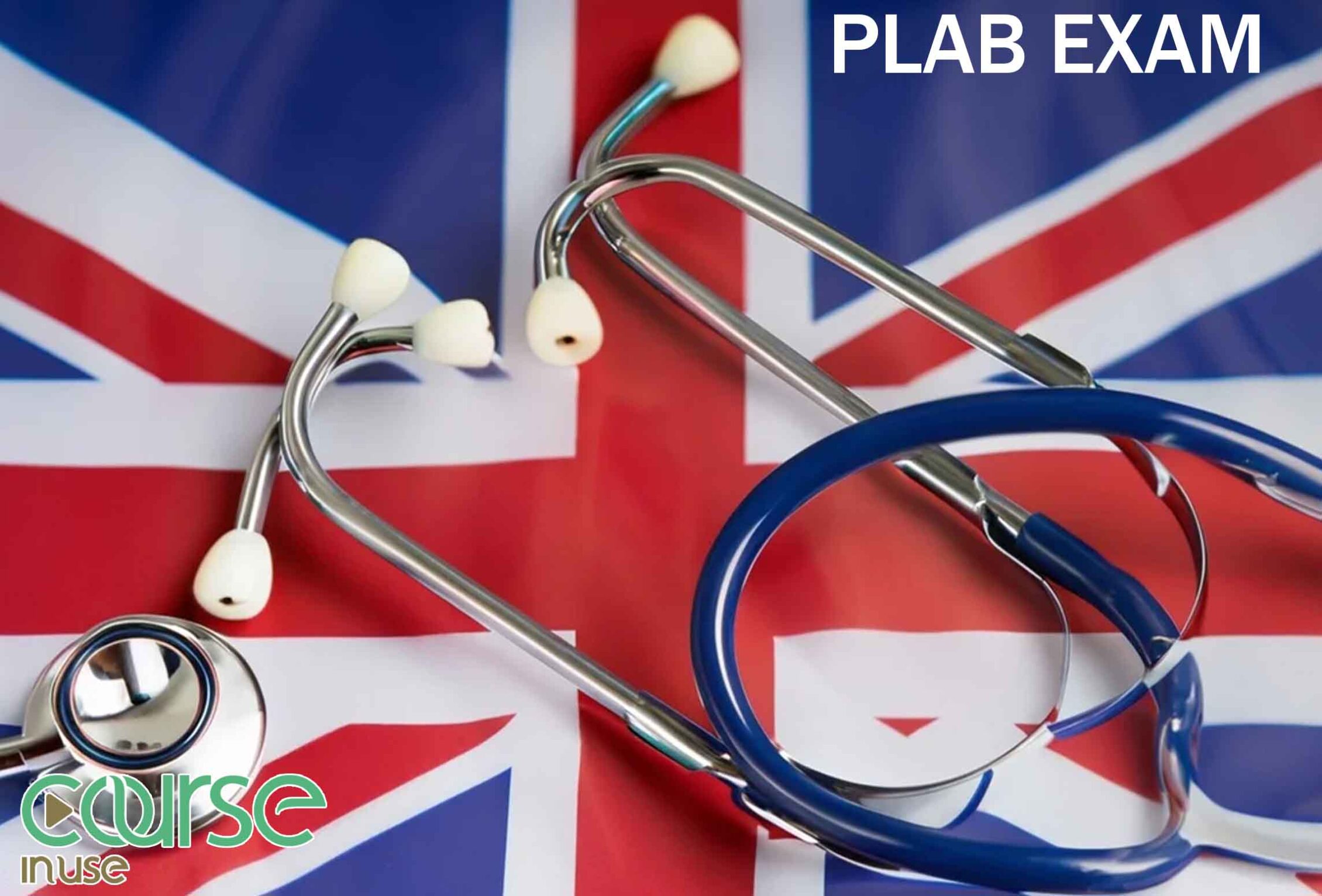The PLAB exam is the key to your entry into the world of medicine in one of the most advanced health systems in the world, the United Kingdom. In this blog, we will review the structure and content of the PLAB exam, the essential tips for success in this exam, the frequently asked questions of the PLAB exam, and also the comparison of this exam with We will cover other international medical exams such as USMLE exam , AMC exam, MCCQE exam, so stay with us until the end of this article
What is the PLAB test?

PLAB (Professional and Linguistic Assessments Board) is organized by the General Medical Council of the GMC. The PLAB exam is designed to assess and evaluate the skill and knowledge level of international doctors who are applying to work and practice medicine in the UK In other words, this test compares the qualification level of new international doctors in the UK with doctors educated in the UK, in other words, this test is for doctors who have graduated from non-GMC approved medical universities and intend to practice medicine in the UK. It is very important.
Why is the PLAB test important?
1.Requirement to register in GMC
If you, as an international doctor, intend to practice medicine in the UK, you must first register with the General Medical Council, which requires passing the PLAB exam to register with the GMC.
2.Ensure eligibility
As an international doctor, you must provide the British health system with the assurance that you have the skills and knowledge to provide safe and effective medical care and services to patients. The PLAB test checks whether your skills as an international doctor Does it comply with British medical standards?
3.Opportunity to work in the NHS
NHS, or the National Health Service, is one of the largest health systems in the world, and many international doctors practice medicine in this system. By passing the PLAB exam, you will be able to work in the NHS.
4.International job opportunities
Passing the PLAB exam, in addition to helping your professional credibility, provides you with the possibility that in addition to being recognized in the international arena, the opportunity to work and practice medicine in other English-speaking countries is also provided to you, in other words, to have This standard qualification is part of your professional background in order to be eligible to work in the UK health system
PLAB exam eligibility criteria
Before starting the challenging path of the PLAB exam, it is important to know whether you, as an applicant, have the necessary conditions to participate in this exam, which we have explained below.
In order to be eligible for PLAB 1, you must be a medical graduate from a recognized foreign university. It is worth noting that if you have not yet graduated, you must have a certificate showing that you have passed the final exams. Another thing that you should consider as an international applicant is that you must have the necessary ability in English. You are required to provide IELTS exam or OET exam in order to prove your English language skills.
PLAB Exam Syllabus
| Subject | |
| Blood and lymph | Abnormal blood film
Bruising/ bleeding/ purpura Generalised enlarged lymph nodes Pallor |
| Breast | Breast lump and/or pain |
| Cardiovascular | Chest pain
Fatigue Heart murmur Hypertension Palpitations Peripheral arterial disease Peripheral oedema, breathlessness Peripheral venous problems |
| Child health | Congenital abnormalities
Developmental problems Failure to thrive |
| Digestive | Abdominal mass
Abdominal pain Anorexia and weight loss Facial pain and swelling Jaundice Lower GI symptoms Upper GI symptoms Nutrition |
| Endocrine | Abnormal blood sugar
General endocrine disorder Thyroid abnormalities |
| ENT | Ear ache
Hearing problems Hoarseness and/or stridor Nasal symptoms Vertigo |
| Ethical and professional | Drawing from GMC explanatory guidance
Drawing from Good medical practice (2013) Duties of a doctor |
| Eye | Eye pain
Orbital swelling Red eye Visual impairment |
| Genitourinary | Urethral discharge
Vaginal discharge |
| Homeostatic | Acid-base imbalance and blood gas abnormalities
Electrolyte abnormalities |
| Infectious disease | Hospital-acquired infection
Serious infection Travel medicine and tropical infections Viral infections |
| Mental health | Alcohol and drug use disorder and dependence
Anxiety Deliberate self-harm Eating problems Learning and communication problems Medically unexplained physical symptoms Mood (affective) problems Confusion Personality and behavioural disorders Psychosis Legal frameworks |
| Musculoskeletal | Back and neck problems
Connective tissue disorders Foot and ankle problems Hand and wrist problems Hip problems Knee problems Rheumatological problems Shoulder/upper limb problems Skeletal problems including fractures |
| Neurological | Blackouts and faints (funny turns)
Cranial nerve problems Falls Headache Movement disorders including tremors and gait problems Peripheral nerve problems and abnormalities of sensation Seizures Speech and language disorder Weakness and fatigue |
| Older adults | Confusion
Symptoms of terminal illness |
| Pharmacological | Clinical pharmacology |
| Renal | Abnormalities of the urine
Renal problems Urinary excretion Contraception Fertility problems Normal pregnancy and care Problems in pregnancy including bleeding Irregular vaginal bleeding Cervical smear/ colposcopy Pelvic mass Pelvic pain Vulval and vaginal lumps/lesions Prolapse Urinary incontinence |
| Respiratory | Breathlessness
Chest pain Cough and haemoptysis Wheeze/ Stridor |
| Seriously ill patient | Collapse
Fever/ Infection Multiple trauma Shock |
| Skin | Bites and stings
Bullous Dermatological manifestations of systemic disease Extremes of temperature Hair and nail problems Itchy and/or scaly rashes Infections Lumps Moles and pigmented lesions Ulcers |
| Urological | Groin/scrotal pain and/or swelling
Urinary tract obstruction Abnormalities of the urine Urinary symptoms |
PLAB Exam Structure
| PLAB Exam Component | Format | Duration | Focus | Location |
| PLAB Part 1 | 180 multiple-choice | 3 hours | Clinical scenarios and patient management | Available in multiple countries |
| PLAB Part 2 | Practical exam with 16 OSCE stations | 8 minutes per station | Real-world scenarios, communication skills, and clinical proficiency | Conducted exclusively in the UK |
PLAM exam fees
| PLAB 1 Exam Fee | £268 |
| PLAB 2 Exam Fee | £981 |
| PLAB1CancellationFee for Cancelling More Than 42 Days Before Taking the Exam | £26.80 |
| PLAB 1 Cancellation Fee for Cancelling 42 Days or Less Before Taking the Exam | £268 |
| PLAB 2 Cancellation Fee for Cancelling More Than 42 Days Before Taking the Exam | £98.10 |
| PLAB 2 Cancellation Fee for Cancelling Between 42 and 29 Days Before Taking the Exam | £490.50 |
| PLAB 2 Cancellation Fee for Cancelling 28 Days or Less Before Taking the Exam | £981 |
PLAB exam centers
| Country | City | Country | City |
| Australia | Sydney | India | Chennai |
| Bangladesh | Dhaka | India | Hyderabad |
| Canada | Toronto | India | Kolkata |
| Egypt | Alexandria | India | Mumbai |
| Egypt | Cairo | India | New Delhi |
| Ghana | Accra | Kenya | Nairobi |
| India | Bangalore | Nigeria | Abuja |
| Pakistan | Islamabad | Nigeria | Lagos |
| Pakistan | Karachi | South Africa | Johannesburg |
| Ireland | Dublin | Spain | Madrid |
| Saudi Arabia | Riyadh | Sri Lanka | Colombo |
| UAE | Dubai |
How to register for PLAB exam

In order to register for the PLAB exam, it is enough to complete the steps that we will explain below and take a step towards a professional medical career in the UK.
1.Create a user account in GMC Online
- Log in to the GMC website
- Click on Create an account option and enter your personal information
- After completing the information, you will receive a confirmation email, which will activate your account after confirming the sent email
2.Check eligibility conditions
- Your medical degree must be from an accredited institution. The institution where you obtained your degree must be recognized by the GMC.
- It is worth mentioning that you must have one of the IELTS or OET certificates to prove your English language skills
3.PLAB exam reservation
- Log in to the account you created in GMC Online
- In the My Tests section, choose the appropriate date and place for the PLAB 1 exam
- Pay the test fee
- After paying the exam fee, a confirmation email will be sent to you, which contains your exam reservation information
How to Ace the PLAB Exam: Expert Tips
PLAB1
- Mastering the Syllabus: To succeed in PLAB Part 1, it is important to know which topics in the exam are most important to focus on. These topics include topics such as: cardiology, neurology and emergency medicine.
- Solving past exam questions: Don’t underestimate the importance of previous years’ questions. Solving past questions and analyzing them, in addition to helping you identify important topics from the point of view of the exam designers, will also help you find your strengths and weaknesses.
- Mock tests: Mock tests, in addition to almost simulating the main test and helping you to be in the same environment as the main test, also help you to improve your time management skills. Time management is the most important part to succeed in the PLAB test.
PLAB2
- Practicing OSCE scenarios: Practicing OSCE scenarios will help you to simulate the real conditions of the exam. This simulation will help you to enter the PLAB2 exam session more prepared.
2.Improving communication skills: Communication skills are the most important part of the PLAB2 exam, so try to always use clear and empathetic language.
- Timing your answers: Considering that each station in part 2 of the test has a specific time limit, you should strengthen your time management skills so that you can answer the questions of each station correctly within the specified time limit.
Conclusion
The PLAB exam is a very important step in your professional path as an international doctor in the UK, but don’t worry, you can get the necessary preparation for the exam by using reliable resources, practice tests and sample questions from previous years. We are here to accompany you on this challenging path. We will be with you on the course in use website by providing specialized and high-quality training in addition, in addition to the hours of specialized training, you can also benefit from the practice tests and the question bank of the course in use training group.
FAQs
1.What is the duration of the PLAB exam?
The duration of the pbal1 test is 3 hours, and for plab2 there are 16 stations, and each station takes 8 minutes.
2.Is there an age limit for doctors in the UK?
There is no age limit for PLAB exam
3.Which countries accept the PLAB exam for registration?
- Australia
- New Zealand
- Canada
- Dubai
- Ireland
- Scotland
- Qatar
- United Kingdom
- Saudi Arabia
- Sri Lanka




